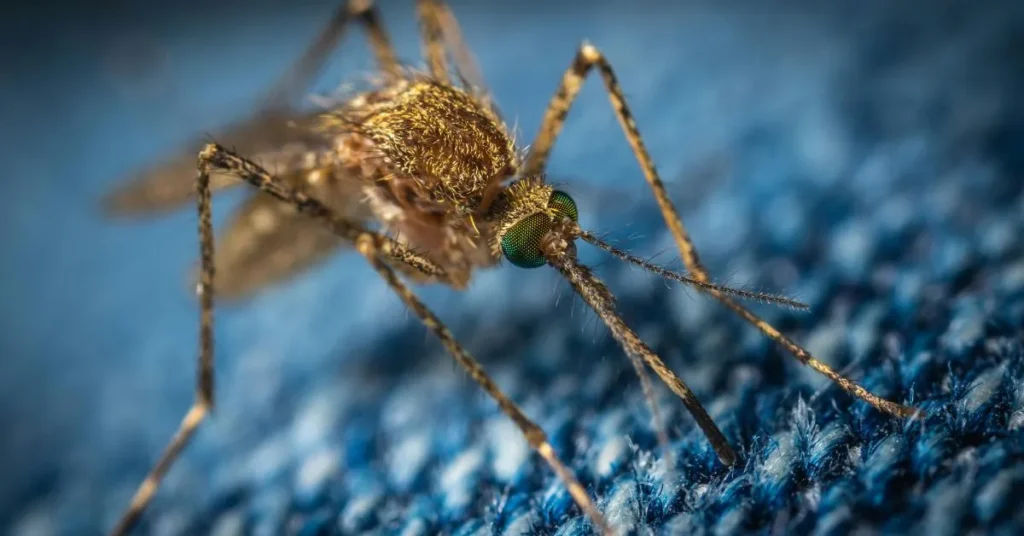As warmer weather approaches, so does the inevitable presence of mosquitoes!
These pesky insects cause itchy bites and pose health risks by transmitting diseases like malaria, dengue fever, and Zika virus. While commercial mosquito repellents contain chemicals that may harm your health and the environment, you can try plenty of natural mosquito control solutions at home. From simple lifestyle changes to DIY remedies, here are ten effective methods to keep mosquitoes at bay without using harmful chemicals.
Contents
Remove Standing Water
Mosquitoes breed in stagnant water, making any sources of standing water in your yard a prime breeding ground. Regularly emptying containers like flower pots, bird baths, and clogged gutters can significantly reduce mosquito populations around your home.
Additionally, consider filling in low-lying areas where water tends to collect or installing a fountain or aerator in ornamental ponds to keep the water moving.
Plant Mosquito-Repellent Plants
Due to their fragrance or chemical composition, certain plants are natural mosquito repellents. Citronella, lavender, marigolds, basil, and lemon balm are just a few examples of plants that mosquitoes tend to avoid. Planting these around your patio or in your garden adds beauty to your outdoor space and helps naturally ward off mosquitoes.
Use Mosquito Nets
Mosquito nets are a simple yet effective way to protect yourself from mosquito bites while sleeping. Installing nets over windows and doors allows you to keep them open for fresh air without inviting in mosquitoes. You can also use mosquito nets over beds and cribs to create a barrier against these insects, especially in areas with prevalent mosquito-borne diseases.
Maintain Your Yard
Keeping your yard well-maintained can go a long way toward reducing mosquito populations. Trim tall grass and shrubs where mosquitoes like to rest during the day, and regularly mow your lawn to eliminate hiding spots. Remove debris and leaf litter where water can accumulate, and consider planting ground covers like mint or pennyroyal, which mosquitoes dislike.
Use Essential Oils
Certain essential oils are known for their mosquito-repelling properties and can be used to create homemade repellents. Among popular choices are Citronella, eucalyptus, tea tree, peppermint, and lemongrass oils. You can dilute these oils in a carrier oil like coconut or jojoba oil and apply them to your skin, or mix them with water to create a spray for your home and yard.
Install Mosquito Traps
Mosquito traps are designed to attract and capture mosquitoes using light, heat, carbon dioxide, or other bait. While commercial traps are available, you can make your own using simple materials like plastic bottles, sugar water, and yeast. Place these traps in areas where mosquitoes are prevalent but away from sitting areas to avoid attracting them closer to you.
Use Fans
Mosquitoes are weak fliers, so using fans can help create a barrier against them. Positioning fans on your patio or deck creates airflow that makes it difficult for mosquitoes to fly, reducing their likelihood of landing on you. Indoors, ceiling fans or portable fans can help circulate air and keep mosquitoes at bay.
Avoid Peak Mosquito Activity
Mosquitoes are most active during dawn and dusk, so avoiding outdoor activities can help minimize exposure to them. If you must be outside during peak mosquito hours, wear long sleeves and pants and apply mosquito repellent to exposed skin. Additionally, consider using outdoor lighting that doesn’t attract mosquitoes, such as yellow bug lights.
Encourage Natural Predators
Introducing natural mosquito predators into your yard can help keep populations in check. Dragonflies, bats, birds like purple martins and swallows, and certain fish species like gambusia (mosquito fish) are all voracious mosquito predators. Creating habitats for these animals, such as bat houses or bird feeders, can help attract them to your yard.
Use Garlic Barrier Spray
The garlic barrier spray is a natural mosquito repellent made from garlic extract and water. When it is sprayed around your yard, it creates a barrier that mosquitoes dislike, effectively reducing their presence. While the smell of garlic may be strong initially, it dissipates quickly, leaving behind a subtle scent that humans barely notice but mosquitoes find repellent.
Conclusion
By implementing these ten natural mosquito control solutions, you can effectively reduce mosquito populations around your home while minimizing your impact on the environment and your health. From simple lifestyle changes to DIY remedies, there are plenty of options to choose from to enjoy a mosquito-free summer outdoors.

